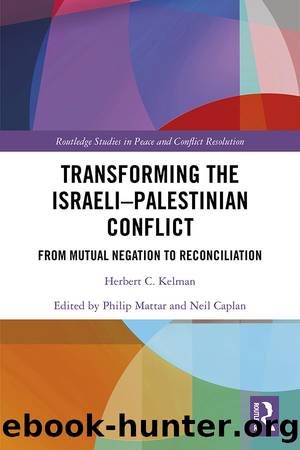Transforming the Israeli-Palestinian Conflict: From Mutual Negation to Reconciliation by Herbert C Kelman

Author:Herbert C Kelman [Kelman, Herbert C]
Language: eng
Format: epub
ISBN: 9781138047969
Goodreads: 34702758
Publisher: Routledge
Published: 2018-04-30T00:00:00+00:00
The nature of the acknowledgment
Acknowledgment of the otherâs nationhood is no easy assignment in the IsraeliâPalestinian conflict, which has been characterized from the beginning by mutual denial of the otherâs identity (see Chapter 1 in this volume) and has been perceived by the two parties as a zero-sum conflict with respect to national identity and existence (see Kelman, 1986 and Chapter 4 in this volume). In order to have the desired impact, the acknowledgment would have to have several characteristics, some of which have already been alluded to.
The acknowledgment must be reciprocal. The element of reciprocity provides the moral thrust that a shared commitment to certain basic principles as the framework for the negotiations has to have. Reciprocity does not imply a precise parallelism in the way the acknowledgment is stated by the two sides, as each partyâs acknowledgment will have to be adapted to its own unique constraints and to the other sideâs specific needs.
The acknowledgment must be deliberate and explicit. It is not enough to offer hints, or to leave the acknowledgment implicit, or to minimize it as something that is so obvious that there is no need to state it. To provide the necessary reassurance, the acknowledgment must be made publicly, explicitly, and clearly by both sidesâpreferably at the same time. Moreover, it must be presented as part of a deliberate strategy of mutual reassurance, designed to inject an element of hope into the negotiating process.
The acknowledgment must be nontrivial, yet feasible. If the acknowledgment is to be meaningful to the recipient, it must introduce something new: something that has not already been said at all or that has not been said clearly and explicitly. Of course, if it has not already been said, it may be precisely because the parties are not willing or ready to say it. Thus, to determine the potential usefulness of the strategy proposed here, one has to establish that on the continuum of statements that can be made about the otherâs nationhood, there remains a (probably quite narrow) range between those statements that would be quite trivial because they are already widely accepted, and those that would be infeasible, because the parties cannot now be induced to make them. I believe that such a range exists and it is within that range that the proposed acknowledgment must be situated.
Some will argue that acknowledgment of the otherâs nationhood is by now superfluous, pointing to the fact that Israelis no longer deny that there are Palestinians and use the term âPalestinianâ freely, that Palestinians have officially recognized Israel and no longer refer to Israel as the âZionist entity,â and that both sides are now participating in what is officially described as IsraeliâPalestinian negotiations. But there has not been a clear and explicit acknowledgment of the otherâs nationhood, nor have the parties accepted some of the implications of such an acknowledgment.
The acknowledgment must be substantial enough to provide significant reassurance to the recipient without excessively threatening or compromising the giver. This requirement is, in effect, a substantive extension of the previous one.
Download
This site does not store any files on its server. We only index and link to content provided by other sites. Please contact the content providers to delete copyright contents if any and email us, we'll remove relevant links or contents immediately.
The European Opportunity by Felipe Fernández-Armesto(572)
The European History Highway: A Guide to Internet Resources by Dennis A. Trinkle Scott A. Merriman(543)
The Seven Wonders of the Ancient World by Michael Denis Higgins(529)
Morgan Kaufmann Digital Watermarking and Steganography by Ingemar Cox Matthew Miller Jeffrey Bloom Jessica Fridrich Ton(529)
Hyperculture by Byung-Chul Han(512)
European Security without the Soviet Union by Stuart Croft Phil Williams(511)
The Routledge companion to Christian ethics by D. Stephen Long Rebekah L. Miles(510)
European Security in a Global Context by Thierry Tardy(507)
Get Real with Storytime by Julie Dietzel-Glair & Marianne Crandall Follis(445)
Hudud Al-'Alam 'The Regions of the World' - a Persian Geography 372 A.H. (982 AD) by V. V. Minorsky & C. E. Bosworth(440)
Tibetan Studies in Comparative Perspective by Chih-yu Shih Yu-Wen Chen(437)
Gorbachev And His Generals by William C. Green(430)
Governance, Growth and Global Leadership by Espen Moe(428)
CliffsNotes on Fitzgerald's The Great Gatsby by Kate Maurer(414)
How Languages Are Learned 5th Edition by Patsy M Lightbown;Nina Spada; & Nina Spada(410)
The Egyptian Economy, 1952-2000 by Khalid Ikram(389)
The Oxford History of the World by Fernández-Armesto Felipe;(388)
Oral Poetry and Narratives from Central Arabia: The Poetry of Ad-Dindan : A Bedouin Bard in Southern Najd (Studies in Arabic Literature, Vol 17) (English and Arabic Edition) by P. M. Kupershoek P. Marcel Kurpershoek(368)
The Oxford Handbook of the Incas by Sonia Alconini(368)
